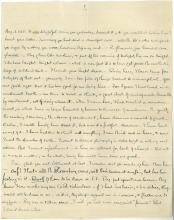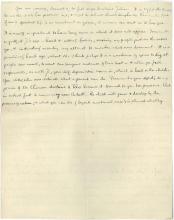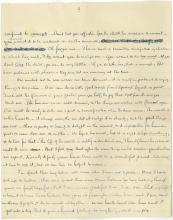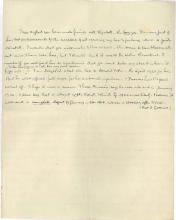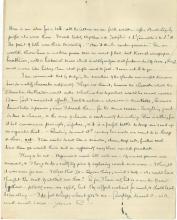BRACERS Record Detail for 18683
To access the original letter, email the Russell Archives.
"It was delightful seeing you yesterday, Dearest O., and you wouldn't believe how I loved your letter. I was sorry you had such a dreadful cold — all the Dr’s who ever go at you begin by making you worse, however they may end. — The flowers you brought are glorious — they glow like sunshine, and put off the coming of twilight, they are so bright. I do love bright bright colours — what a comfort it is to have got past the aesthetic days of subdued tints — I loved your bright dress — "
This copy was printed from microfilm 61.
A typescript was made of the last third of the letter, beginning "I am sorry about Rimbaud"—document .201181, record 116689. This typescript also has a carbon, document .201206, record 124999. A different typing was also done, document .201207, record 125000. A photocopy is also in Rec. Acq. 1095, record 61338; it was created from the typing of .201181. This last third of the letter was not printed in SLBR. Instead the remaining section of Russell's letter of 8 August 1918, letter no. 1489g, record 18684, "completed" the letter.
Letter 57
BR TO OTTOLINE MORRELL, 1 AUG. 1918
BRACERS 18683. AL. U. of Texas, HRC. SLBR 2: #318
Previous Brixton letter, BRACERS 19338; next letter, BRACERS 19339
Edited by K. Blackwell, A. Bone, N. Griffin and S. Turcon
<Brixton Prison>1
Aug. 1. 1918.
It was delightful seeing you yesterday, dearest O., and you wouldn’t believe how I loved your letter.2 I was sorry you had such a dreadful cold — all the Dr’s who ever go at you begin by making you worse, however they may end. — The flowers you brought are glorious — they glow like sunshine, and put off the coming of twilight, they are so bright. I do love bright bright colours — what a comfort it is to have got past the aesthetic days of subdued tints — I loved your bright dress. Being here, I have time for delights of that sort — generally I am too full of things I want to accomplish. You are quite right that it has been good for me being here. For 2 years I had lived in a continual bustle — no time to read or think, a great deal of misery made bearable by excitement, not by rising above it. When I came here, I had reached a creative mood, in which I was no longer haunted by horrors to the verge of madness. The quiet, the reading and thinking, the absence of excitement, have done me a world of good. Earlier, I could hardly have stood it, but now it is fruitful. However, I have had enough of it. I have had time to think out everything I can think out in here, and now I need the stimulus of talk. I want to discuss philosophy in order to get on with my new notions. And I want refreshment — in here one gets tired for lack of change. But not in a way to matter; on the whole, being here will have done me good.
I am glad you met Littlewood at last. I wonder what you made of him. I love him. — Ouf! I hate all the Bloomsbury crew, with their sneers at anything that has live feeling in it. Beastly of them to be down on S.S.3 They put up with me because they know I can make any one look ridiculous — if I had less brains, and less satire, they would all be down on me — as it is, they whisper against me in corners, and flatter me to my face. They are a rotten crew. I wish you had more congenial “friends”. But I don’t know who.
You are wrong, dearest O, to feel as you do about Julian.4 It is right she should be as she is at her present age, and right the school should keep her so. Remember that if one’s spiritual life is as constant as yours, it wears one out as it has you. It is really important to have long times in which it does not appear. I remember myself at J’s age — hard and utterly <un>feeling,5 vexing my people just as she vexes you, and instinctively resenting any attempt to awaken what was dormant. It is a peculiarly hard age, about 12. I think perhaps it is a weakness of yours to dig at people too much, to want too frequent evidence of their best — and when you feel responsible, as with J., your self-depreciation comes in, which is hard on the child. You altogether over-estimate what a parent can do. I remember your objecting to my praise of the Chinese doctrine of Tao6 because it seemed to you too passive. But in actual fact it comes very near the truth. The child will grow and develop by the process of nature, and what you can do (beyond material care) is almost wholly confined to example. Don’t let your affection for the child be anxious and moral — you should want it to be natural and rather animal.a Oh forgive me — I have such a terrible realization of children and what they need, I do want you to realize too. You want to do too much. If you don’t like the child, you can do very little. If you do like her, that is enough. But have patience with phases — they pass, but are necessary at the time.
One mustn’t let the war wear one down too much — it is really important to enjoy things and keep alive. One can do so little good to people if one is depressed beyond a point. I wish all the flowers in your garden gave you half the joy that I get from the ones you send me. The human race will survive, and the things we value will flourish again. One must be ready to take one’s part in revivification when the time comes. The world is rather horrible — it always was, tho’ we did not realize it so clearly; but the good things are real — there is poetry and beauty and delight in the world, and it is possible for human spirits to come close one to another. We hoped too much, but it is right to hope something, and to live for that. The life of the world is oddly instinctive in me, I hardly knew how much until the war came. And I feel sure that after the war things will revive quicker than we expect. Twenty to forty years hence there will be a wonderful period. We may not live to see it, but we can live to help it to come.
I’m afraid these long letters will cease when I come out of prison. Here I have such infinite leisure. When one is out there never seems leisure for long letters, though yours are fairly long, for which I am more grateful than I can say. But my life is bound to have less leisure than yours at Garsington. When I am out I see such millions of people, and do so much altogether — no one has the least idea how much I get into a day. But it gives a hurried feeling to everything, which is a pity.
I am so glad you have made friends with Elizabeth — she loves you. I am very fond of her, but embarrassed by the necessity of not rousing my brother’s jealousy, which is quite oriental. I wonder what you will make of Miss Wrinch.7 She seems to have blossomed out since I have been here, but I should think it would be rather theoretical. I wonder if you will find her so academic that you can’t take any interest in her. I hope not. I like her very much — she has very good brains.b — I am delighted about Ka Cox and Arnold Foster8 — she is just right for him. And he will afford full scope for her maternal impulses. — I wonder how P’s speech9 went off — I hope it was a success. I hear America says the war is to end in January 1920. I dare say that is about right, though I think Sp. 1920 more likely. I believe it will end in complete defeat of Germany — like 1814.10We are in 1810 now, after Tilsit.11 (sheet 3 follows)
Here is an idea for a book: all the letters one can find written after Austerlitz12 by people who were there. I read lately Napoleon’s to Joséphine13 and Ld. Granville’s to Ly. B.14 The point of both was their triviality. “How it struck contemporaries.” Then one would show how a modern person sees an event of that sort through newspaper headlines, with a historical sense which is oddly vulgar and not fundamentally true, though much more like history than what people used to feel. I commend it to you.
I am convinced that by studying the secretions of the glands we might discover how to modify character15 artificially. I hope we shan’t, because the character which the Education Authorities would order schoolmasters to produce would be much worse than God’s unaided efforts. I used to welcome advances in knowledge, because knowledge is power; now I dread them, for the same reason. Everything good is due to chance, and the area of chance is continually diminishing. There is nothing for it but conscious principle, in future; and it is a fearful battle to keep one’s end up as regards that. — Reading so much 18th century has made me want to be sharp and clear, net.16 I like words to cut like a scimitar, clean, deep cuts, further each time than you would think such an apparently easy blow could penetrate.
I long to be out. Happiness and work both call me. My mental powers are renewed, and I long to do a really big piece of exploring work once more. I thought it was over for ever. I bless that Dr. Queer thing, mind and body — who could have thought the seat of intellect17 was there? So far, I have only hit on a number of new hypotheses — probably none are right, but they afford material for work, and should lead to something. — I do feel so happy about you and me. Goodbye dearest O — with much much love.
Your
B.
- 1
[document] The letter was edited from a digital scan of the initialled original in BR’s hand in the Morrell papers at the University of Texas at Austin. Sheet 3 was associated with Letter 61, but it clearly belongs here, in the discussion of the Napoleonic wars. The letter was published as #318 in Vol. 2 of BR’s Selected Letters.
- 2
your letter Ottoline’s letter of 30 July 1918 (BRACERS 114752).
- 3
I hate all the Bloomsbury crew … down on S.S J. Middleton Murry (representing Bloomsbury in BR’s eyes) had recently published a negative review of Siegfried Sassoon’s Counter-Attack and Other Poems, to which both BR (Letter 39) and Philip Morrell wrote letters to the editor of The Nationin reply. On 30 July 1918 Ottoline reported to BR that the Bloomsberries were “very angry” with her husband for criticizing Murry’s assessment of Sassoon’s poetry. Several painters and writers associated with the group, for which Ottoline’s Garsington Manor had become a prized retreat, are mentioned in BR’s prison letters. Most individuals were either friendly or neutral, and Ottoline assured BR a few days later that “All here talk of you every few hours and all Love, adore and worship you! Quite true this is” (4 Aug. 1918, BRACERS 114753). Lytton Strachey was the only Bloomsbury figure so identified in Ottoline’s account of the group’s defence of Murry (30 July 1918, BRACERS 114752). According to Bloomsbury scholar S.P. Rosenbaum, BR’s distaste for the “Bloomsbury crew” may have extended to the Woolfs and “probably” to Virginia’s brother-in-law, Clive Bell, as well as J.M. Keynes. The art critic Bell nevertheless captured the essence of his group’s somewhat ambiguous relationship to BR, who “though no one has ever called him ‘Bloomsbury’ appeared to be a friend and was certainly an influence” (quoted in Rosenbaum, “Bertrand Russell in Bloomsbury”, Russell 4 [1984]: 26).
- 4
feel as you do about Julian Ottoline’s letter to BR of 30 July 1918 (which she probably delivered discreetly during her prison visit the next day), complained that her daughter, Julian Ottoline Morrell (later Goodman, then Vinogradoff, 1906–1989), had returned home “in rather a difficult mood, very contradictory and gruff and disobeying.… Julian has a dreadfully depressing effect on me. I feel it is all my own incapacity that makes her so tiresome” (BRACERS 114752). Julian, the previous year, had been sent to Lucy Silcox’s school, St. Felix, Southwold.
- 5
hard and <un>feeling BR wrote “hard and feeling”. He must have meant “unfeeling”, and SLBR printed “[un]feeling” (at 2: 166).
- 6
Chinese doctrine of Tao One concept associated with the Chinese philosopher Laozi (fl. 6th century BC) was that there was an ineffable way (tao) that the world both ought to be and, in some sense, was, and that one must recognize this and live in harmony with it. Almost every school of Chinese philosophy had some doctrine of tao, and it would be rash to impute a precise doctrine to BR. The general idea he alludes to here is that one can find one’s tao, not by striving to do so, but by following one’s spontaneous inclinations. It is not known when Ottoline took umbrage at BR’s praise of Taoism, but in September 1914 she had sent him a translation by Lionel Giles of the creed’s semi-mythical founder (The Sayings of Lao-Tze [London: John Murray, 1905]). One such saying by Laozi appeared on the title-page of BR’s forthcoming book, Roads to Freedom (1918): “Production without possession, action without self-assertion, development without domination.”
- 7
I wonder … Miss Wrinch BR’s former logic student Dorothy Wrinch made a highly favourable impression on Ottoline after arriving at Garsington Manor for a visit on 30 July 1918. Indeed, she assured BR that “Miss W. is loved by us all” (4 Aug. 1918, BRACERS 114753).
- 8
Ka Cox and Arnold Foster Katherine (“Ka”) Laird Cox (1887–1938). Before the war, as a student at Cambridge, she had been one of the group of “Neo-Pagans” around Rupert Brooke, with whom she fell in love. In September 1918 she married William Arnold-Forster (1885–1951), a painter in the Royal Naval Reserve.
- 9
P’s speechPhilip Morrell had prepared a speech for the Commons’ adjournment debate of Allied war aims on 8 August. But he never delivered it because the discussion, on the last day of the parliamentary session, was foreshortened by James Lowther, the Conservative Speaker of the House. Lowther was considered by Ottoline as “unfair to Pacifists” (to BR, 11 Aug. 1918, BRACERS 114754). On 30 July 1918 she told BR that Philip was “making a speech for tomorrow on Vote of Credit” (BRACERS 114752), but did not speak on that occasion either.
- 10
complete defeat of Germany — like 1814 BR is referring not to Germany’s “complete defeat” 104 years previously but, rather, to that of Napoleonic France. Indeed, a revitalized Prussia was a key member of the anti-French coalition that forced Napoleon’s abdication and exile in April 1814. Although a depleted French army continued to achieve battlefield success in the War of the Sixth Coalition (1813–14), France’s overall military position had become unsustainable. Starting with German Social Democracy (London: Longmans, Green, 1896, p. 43), Russell often referred to this late phase of the Napoleonic Wars as Prussia’s “war of liberation” — in connection with the rise of a German nationalism stimulated by earlier military defeats inflicted by France.
- 11
Tilsit The collaboration between France and Russia which began with the Treaty of Tilsit in 1807 ended in 1810 when Russia withdrew from Napoleon’s blockade of Britain.
- 12
Austerlitz The Battle of Austerlitz (1805), one of Napoleon’s great victories, in which he decisively defeated Austria and Russia.
- 13
Napoleon’s to Joséphine His letters of 3, 5, and 7 December 1805. For a contemporary English edition, see Letters to Josephine, 1796–1812, ed. Henry Foljambe Hall (London: J.M. Dent, 1901).
- 14
Ld. Granville’s to Ly. B. “Bessborough.” (BR’s note at BRACERS 119460 for Letter 40: see notes 9 and 10 there.) See Lord Granville, Private Correspondence, 1781–1821 (London: J. Murray, 1917), 2: 151–2 (letter of 6 Dec. 1805).
- 15
secretions of the glands … modify character BR’s prison reading included Walter B. Cannon’s pioneering inquiry into the physiology of emotions: Bodily Changes in Pain, Hunger, Fear and Rage: an Account of Recent Researches into the Function of Emotional Excitement (New York and London: D. Appleton, 1916). In “On ‘Bad Passions’” (written in prison; 19 in Papers 8), BR cited Cannon’s work, saying it suggested “immense possibilities” in changing character. In a 1920 review (5 in Papers 9), he praised the “epoch-making researches” of this American neurologist and Harvard professor of physiology. He included a longer commentary on them in The Analysis of Mind (London: Allen & Unwin, 1921), pp. 280–3, and drew attention to the possibilities of character modification in works up to at least 1931 (The Scientific Outlook (London: Allen & Unwin), p. 188.
- 16
net French for “clear-cut”, “distinct”.
- 17
bless thatDr. … seat of intellect “Who cured me of piles.” (BR’s note at BRACERS 119466.) The doctor was Elizabeth Russell’s brother Sydney Beauchamp (see note 7 to Letter 15).
